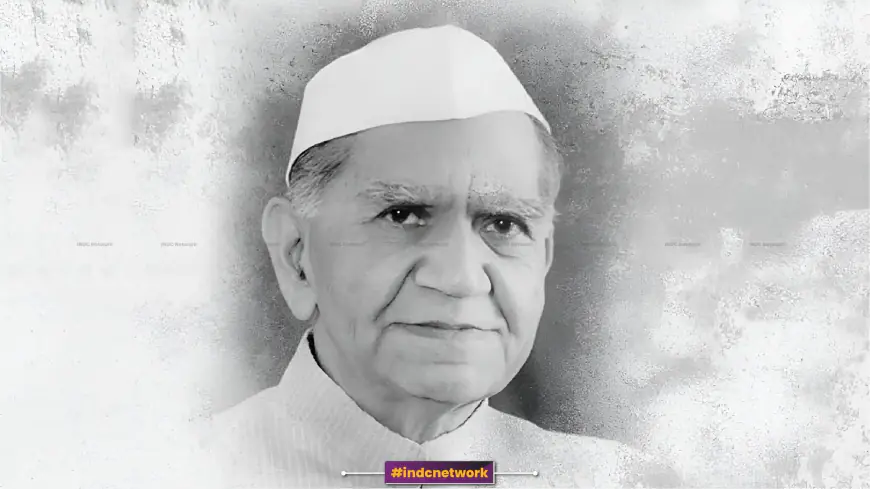Biography of Fakhruddin Ali Ahmed (1974–1977)
Early Life and Education : Fakhruddin Ali Ahmed was born on May 13, 1905, in the town of Goalpara in the then Assam Province of British India. He hailed from a distinguished family; his father, Syed Ali Ahmed, was a respected landowner and his mother, Sayeeda Jahanara Begum, was known for her commitment to education and social welfare. Growing up in a politically aware household, Ahmed was exposed to the national movement for independence from an early age.
Ahmed's early education began in Goalpara and later continued in the historic city of Shillong, where he attended St. Edmund's College. His thirst for knowledge and excellence led him to pursue higher education at the Aligarh Muslim University (AMU), one of the premier institutions in India. At AMU, he not only excelled academically but also became involved in student politics, aligning himself with the broader struggles for Indian independence and social justice.
In 1926, after completing his degree in law, Ahmed joined the bar and began his legal practice in the district courts of Assam. His education and early experiences in law equipped him with the skills needed to navigate the complexities of Indian politics in the years to come.
Early Political Career
Fakhruddin Ali Ahmed’s political career began in earnest in the 1930s when he joined the Indian National Congress, the primary political organization leading the struggle for independence from British rule. He was influenced by the ideas of prominent leaders such as Mahatma Gandhi and Jawaharlal Nehru, who emphasized the importance of unity, non-violence, and social justice.
Ahmed’s political engagement during this period coincided with significant events in Indian history, including the Civil Disobedience Movement and the Quit India Movement. His commitment to the cause of independence was evident in his active participation in various protests and campaigns against colonial rule.
In 1937, he was elected to the Assam Legislative Assembly as a member of the Congress Party. His tenure in the assembly was marked by his advocacy for social reforms, education, and the rights of farmers. His effective leadership and ability to connect with the grassroots made him a respected figure in Assam’s political landscape.
During the tumultuous years of World War II, Ahmed remained active in the freedom struggle, advocating for the rights of Indians and criticizing British policies that disproportionately affected the rural population. He worked tirelessly to promote social welfare and uplift the marginalized communities in Assam.
Ministerial Roles and Contributions
Following India’s independence in 1947, Fakhruddin Ali Ahmed continued to rise in political stature. He served as the Minister of State for Education and later as the Minister for Food and Agriculture in the Assam government. In these roles, he focused on improving education access, enhancing agricultural productivity, and addressing the challenges faced by farmers.
Ahmed’s dedication to education was particularly significant. He believed that education was the key to empowering individuals and communities, particularly for those who had historically been marginalized. He championed the establishment of schools and colleges in rural areas, aiming to increase literacy rates and provide opportunities for all.
His tenure as Minister for Food and Agriculture was equally impactful. He implemented policies aimed at increasing agricultural output, supporting farmers, and ensuring food security for the growing population. His efforts to modernize farming practices and promote cooperative farming were instrumental in uplifting the agricultural sector in Assam.
In recognition of his contributions to education and social welfare, Ahmed was appointed as the Governor of Assam in 1955. His tenure as governor saw him actively engage in various initiatives aimed at promoting peace and harmony in a region that had been fraught with ethnic tensions and communal strife.
Ascendancy to the Presidency
Fakhruddin Ali Ahmed's extensive political experience and reputation as a principled leader earned him recognition beyond Assam. In 1967, he was elected as a Member of Parliament for the Congress Party and later appointed as the Union Minister for Education. His commitment to education reform and social justice continued to be his hallmark during this period.
In 1974, the incumbent President of India, Zakir Husain, passed away, leading to a vacancy in the presidential office. As a member of the Congress Party, Ahmed was a strong contender for the presidency. His political experience, commitment to democratic values, and reputation for integrity made him a suitable candidate for the role.
On August 24, 1974, Fakhruddin Ali Ahmed was elected as the fifth President of India. His election was seen as a significant moment for Indian Muslims, as he became the first Muslim to hold the office since independence. Ahmed’s presidency symbolized the principles of secularism, unity, and diversity that underpin Indian democracy.
Presidency (1974–1977)
Fakhruddin Ali Ahmed’s tenure as President unfolded during a period of considerable political turmoil in India. His presidency was marked by his efforts to uphold the constitutional framework and protect democratic values amidst rising tensions within the Indian political landscape.
One of the most significant events during Ahmed's presidency was the declaration of the Emergency in June 1975 by Prime Minister Indira Gandhi. The Emergency, which lasted until March 1977, was characterized by a suspension of civil liberties, censorship of the press, and political repression. Indira Gandhi justified the Emergency by citing the need to restore order and address socio-economic challenges facing the country.
While some leaders within the Congress Party supported the Emergency, others, including Ahmed, expressed concerns about the implications for democracy and civil rights. As President, Ahmed was in a position of significant authority, but the realities of the Emergency challenged the traditional roles of the office.
Despite the extraordinary powers conferred upon him during this period, Ahmed sought to navigate the complexities of governance while remaining true to his principles. He made efforts to reassure the public and maintain a semblance of constitutional authority, even as dissent was stifled.
Challenges During the Emergency
During the Emergency, Ahmed faced numerous challenges. The political landscape was increasingly polarized, and the government took a hardline approach against opposition leaders and activists. Human rights abuses and suppression of dissent became commonplace, and the media was subject to strict censorship.
Ahmed's position was complicated by the fact that he had to balance the need for national stability with his commitment to democratic principles. He became a symbol of resilience in the face of political challenges, emphasizing the importance of maintaining public trust in the office of the President.
As President, Ahmed had the constitutional authority to review and approve legislation. During the Emergency, several controversial laws were enacted, including the Maintenance of Internal Security Act (MISA), which allowed for the detention of individuals without trial. Ahmed’s assent to these laws raised questions about the extent to which he was willing to exercise his powers as President to safeguard civil liberties.
Post-Emergency Period
As the Emergency came to an end in March 1977, Fakhruddin Ali Ahmed found himself in a transformed political environment. The first general elections after the Emergency were held in early 1977, resulting in a historic defeat for Indira Gandhi and the Congress Party. The Janata Party, a coalition of opposition parties, emerged victorious, marking a significant shift in Indian politics.
Following this electoral defeat, Ahmed faced a new set of challenges as President. He had to work with a new government led by Morarji Desai, the first non-Congress Prime Minister of India. The transition of power was marked by a sense of uncertainty, and Ahmed’s role as a unifying figure was crucial in maintaining stability during this period.
Despite the political upheaval, Ahmed remained committed to the principles of democracy and social justice. He continued to advocate for policies that promoted unity in diversity and addressed the needs of marginalized communities. His emphasis on education and social welfare remained a central theme throughout his presidency.
Legacy and Contributions
Fakhruddin Ali Ahmed’s presidency is often remembered for its challenges during the Emergency, but his contributions to Indian politics and society extend far beyond that period. His lifelong commitment to education, social justice, and democratic values left an indelible mark on the nation.
Ahmed’s emphasis on education as a means of empowerment resonated with many. He believed that access to quality education was essential for fostering a sense of national identity and promoting social cohesion. His advocacy for educational reforms, particularly in rural areas, laid the groundwork for future initiatives aimed at improving literacy and educational outcomes across the country.
Furthermore, Ahmed’s presidency symbolized the importance of representation and inclusivity in Indian politics. As the first Muslim President of India, he represented the aspirations of a significant segment of the population and reinforced the idea that leadership should reflect the diversity of Indian society.
In recognition of his contributions, Ahmed was awarded several honors and accolades posthumously. His legacy continues to inspire generations of leaders and activists who strive for social justice, equality, and democratic governance.
Fakhruddin Ali Ahmed passed away on February 11, 1977, shortly after his term as President ended. His life and career remain a testament to the values of integrity, dedication, and service to the nation.
Conclusion : Fakhruddin Ali Ahmed’s presidency was marked by both challenges and triumphs. From his early days in Assam to his rise as the fifth President of India, Ahmed’s life reflects the journey of a dedicated leader committed to social justice, education, and democratic values.
Despite the trials faced during the Emergency, Ahmed’s legacy as a champion of democracy and inclusivity endures. His contributions to Indian politics, education, and social welfare continue to resonate, serving as an inspiration for future generations committed to building a more just and equitable society.
As a symbol of resilience and commitment to the principles of unity and diversity, Fakhruddin Ali Ahmed’s life and career are a reminder of the power of leadership rooted in service, integrity, and a vision for a better India.















































































































































































